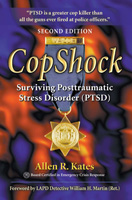
CopShock: Second Edition
Surviving Posttraumatic Stress Disorder (PTSD)
by Allen R. Kates, MFAW, BCECR
Police Dispatcher Trauma
Police Dispatchers are often the forgotten heroes when we talk about police stress, trauma and PTSD. After a critical incident, peer support groups may debrief police officers who were at the crime scene. Sometimes dispatchers who were involved with the call are included, but too often they are overlooked.
In the definition of PTSD, the main
criterian is that the subject experienced or witnessed an event that involved
actual or threatened death or serious injury. Police dispatchers witness many
scenes of death, mayhem and destruction while talking on the phone to victims.
Yet there is little resolution. They often don’t know what eventually happened,
whether the victims lived or died. When the critical incident involves a police
officer such as an officer down call, suicide-by-cop, a shootout, or high-speed
pursuit, the dispatchers suffer even more dramatically. They may experience
adrenaline rushes, heart palpitations, anxiety, and fear. They may have
sleepless nights, get irritable and angry, and develop eating disorders. Only in
the past few years has police dispatcher trauma been fully recognized and
understood.
CopShock, second edition, contains an entire chapter about police dispatcher trauma.

Police dispatchers will benefit greatly from the
support sources listed for police officers in the Trauma Support Sources section of this website, but here
are some sources specifically for police dispatchers.
911
Cares
911 Cares is run by volunteer 9-1-1 professionals who
offer emotional support including stress debriefings to emergency communicators
during difficult times or events. In addition, the organization awards “Everyday
Heroes” within the industry, and provides public and agency education about
9-1-1 issues.
Go to: http://www.911cares.com. Phone: 650-595-5202 ext 102 or 103. E-Mail: Kevin@pstc911.com.
9-1-1
Magazine
9-1-1 Magazine: Managing Emergency Communications is
a print magazine for dispatchers that is published nine times a year. It
contains a blending of product-related technical, operational, and
people-oriented features. The magazine covers provocative issues and major
incidents from both a responder and a communications standpoint. In addition,
the website offers photo stories, career opportunities, web links, selected
stories from past issues, and a 9-1-1 resource directory.
Go to: http://www.9-1-1magazine.com.
Dispatch Monthly
Magazine
This online monthly newsmagazine offers a great deal
of information dispatchers will be interested in. It connects to news stories
that involve 911 dispatchers, provides a forum and bookstore, and addresses
issues such as shifts, staffing, training, preparedness and stress management.
Go to: http://www.911dispatch.com. Contact: Gary
Allen. Phone: 877-370-3477. E-mail: editor@911Dispatch.com.
Headsets911
This website is about “helping
dispatchers cope with stress,” and was founded and developed by one of your
own—T. P. McAtamney, who served over ten years in emergency dispatching. The
site is filled with articles about what dispatchers do, and how they react to
stress, offers links to other helpful sites, free materials, a newsletter, and a
weekly podcast. It also offers a seminar that addresses the stressors that
affect 911 dispatchers, discusses positive and negative stress, how to cope with
stress, PTSD, and nutrition.
Go to: http://www.headsets911.com. Phone:
954-270-8201. E-mail: tpmac@headsets911.com.
Under the
Headset
Under the Headset: Surviving Dispatcher Stress (2000,
Staggs Publishing) is a book about dispatcher stress and trauma. It was written
by Richard Behr, a dispatcher and critical incident stress instructor, and
covers the stress process and how to cope with it. It includes some humorous
chapters, stories to inspire the dispatcher, prayers, and stories of survival.
At just 116 spiral-bound pages, it answers a lot of questions about life on the
headset and how to avoid the predictable burn-out after only two to three
years.
The book can be found at: http://www.amazon.com, www.staggspublishing.com, or www.chevronpublishing.com.
To top of page
Copyright © 2008, 2025 by Allen R. Kates